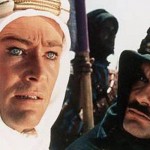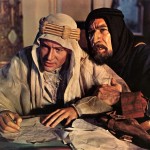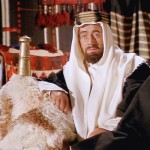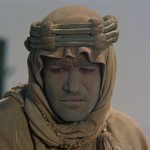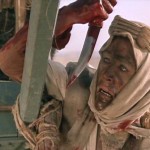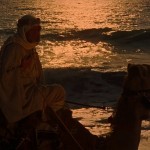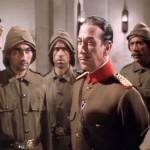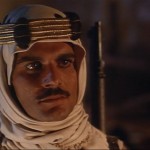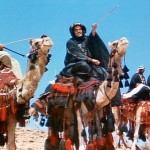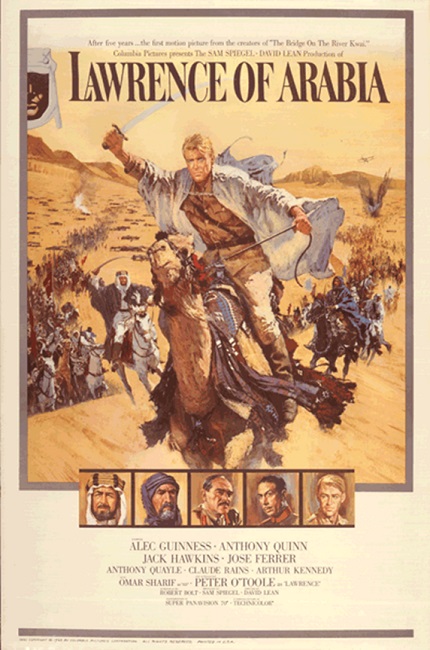
Lawrence of Arabia – 1962
Lawrence of Arabia was yet another epic war movie. This time we go back to World War I with another exotic location. Obviously, the film is set in Arabia, and follows the military exploits of T. E. (Thomas Edward) Lawrence. It was truly a grand and epic film. The music was beautiful and memorable, the cinematography was incredible, and the acting was fantastic. Certainly, this was one of the giants in the list of Best Picture winners.
The film was enormous! It had hundreds of extras, many of whom had to be able to ride a horse or a camel. It had some really big name actors like Sir Alec Guiness, Anthony Quin, Jack Hawkins, Omar Sherif, and Claude Rains. It had plenty of action and great emotional depth.
Of course, I could not give a fair review of a film based on an actual historical figure without doing a bit of research on the actual historical figure. How accurately did the art resemble the reality? Well, apparently, there is some debate on the subject. As far as I could tell, the events themselves were fairly accurate; however, Lawrence’s personality, motives, and behavior were not. In the film he is portrayed as a megalomaniac, when in reality, he was charismatic and possibly even enigmatic, but certainly had no delusions of godhood.
The film also portrayed him as a man with divided loyalties between his Arab comrades and the British military. This also did not seem to be the case. Apparently he was quite loyal to his native country. That being said, I’m sure these inaccuracies were allowed to increase the drama of the character. Though many people who actually knew Lawrence were upset by the portrayal, I was not. It made for a good movie.
The film actually starts out with Lawrence’s (Peter O’Toole’s) death and funeral, and then goes back to the beginning of his military service in Arabia. He is portrayed as a man who has no fear of danger or pain, and who has no concept of what cannot be done. These two qualities give him the unique ability to accomplish the impossible. His superior officers assign him to travel to Arabia, find Prince Faisal (Alec Guinness), and assess the situation. What he finds is that the Arabs are salves, both to the Turks who are occupying their territories, and to the British who are controlling their every move in the war, serving their own interests.
O’Toole was a relatively unseasoned screen actor who had only been in three films prior to Lawrence of Arabia. He was mostly known for his extensive stage work, but he did a fine job. His character goes through huge and life-altering changes and O’Toole made it all seem believable. Guiness, who we have seen before in Bridge On the River Kwai, did a truly fantastic job as Prince Faisal. His role had limited screen time, but he really played it superbly and made the character stand out. There is a particular scene in which he is negotiating with the British officers in Damascus where he really displays Faisal’s true colors.
Seeing no way out of their situation, Faisal agrees to go along with British advice and retreats to Yenbo after a major defeat. Lawrence, however, disobeys his orders and organizes a daring, yet successful attack on the city of Aqaba, thus giving the Arabs a victory and a port where the British could off-load much needed supplies. Despite the fact that he disobeyed orders, his success earns him a promotion, and he is sent back to the Arab front.
Along the way he becomes friends with Faisal’s military leader, Ali Sherif (Omar Sharif). More than once, Ali sees Lawrence accomplish things which he would have considered impossible. He begins to respect Lawrence and follow him as if he was the leader. Thus his delusions of grandeur begin. Ali stayed with him and watched, as only a friend could, as he moved back and forth through his mania. Omar Sharif was nominated for Best Supporting Actor for the role. The character was actually a composite of several Arab military leaders, and Sharif did a great job in his portrayal.
Historical accuracy aside, the story was a very dramatic one that delved into Lawrence’s psyche as he journeyed from man to legend, and then back to man again. The writers kept enough truth in the character to allow O’Toole to be convincing. At times he was sane, at times he was crazed, and at times he was lost between the two. Sometimes he seemed to hate killing while at other times, it is revealed that he actually derived pleasure from it. Sometimes he was full of confidence, and the next minute he would be completely deflated. These contradictions made him seem simply unstable, but very interesting to watch.
There was one thing that caught my attention, something that knocked him off his high pedestal at one point in the film. It was an event that changed the man on a fundamental level. He was doing reconnaissance in the city of Daraa. At this point in the film, he has somehow convinced himself that he is not a blonde, blue-eyed British Officer, and that he is actually of Arab descent. He is so sure he can pass himself off as a native Arab that he casually walks into the city that is occupied by the Turks. He is arrested, tortured, beaten to within an inch of his life, and then thrown out into the street. As I watched, I began to suspect that he was also sexually abused by his captors, though this is shown very carefully and subtly. I did a little research and discovered that my suspicions were correct.
Interesting note: Apparently the real life Lawrence was so changed by the experience that he thereafter developed masochistic tendencies. At one point after the war, he paid a military colleague to administer beatings to him.
The movie was filmed mostly in Jordan and Morocco, and I have to give a huge thumbs-up to the cinematographer, Frederick A. Young, who won an Oscar for his work on the film. He was really able to capture the vastness of the desert as well as the horrible carnage of the war. It was really an impressive aspect of the film. Add to that the grand and sweeping music by composer Maurice Jarre, for which he also won an Oscar, and you have a very moving spectacle.
Interesting note: During filming, O’Toole found that riding a camel was not very comfortable, so he bought a piece of foam rubber to add to his saddle. Many of the extras followed his example, causing the native Bedouins to nick-name him “Ab al-‘Isfanjah” meaning, “Father of the Sponge” The idea spread and to this day, some Bedouins add foam rubber to their saddles.
Another interesting note: During filming, O’Toole was almost killed when he fell off his camel. To prevent him from being trampled by the horses running along-side him, his camel stood over him protectively until he was out of danger.
If I had any complaints about the film, it would be the length. It had a running time of 3 hours and 36 minutes, but I think the story could have been told in less time. Maybe shave off around 40 minutes and I would have been just as happy. But that is only a minor complaint. The screen-writers and the director, David Lean did a great job in their story-telling. Their attention to details, their depiction of the horrific battles, and their unwillingness to shy away from the darker aspect of Lawrence’s unstable psyche and experiences, made for a powerful and memorable movie.
